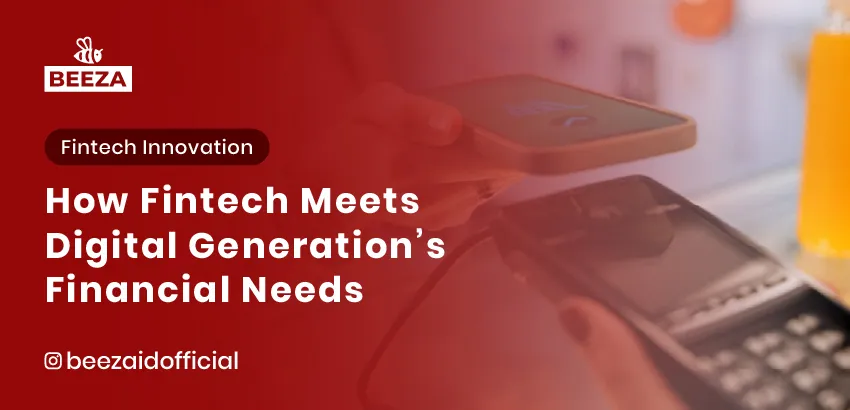
Introduction: How Fintech Meets Digital Generation’s Financial Needs
In today’s digital era, financial needs are becoming more diverse, and the way we meet those needs has dramatically transformed. The digital generation, accustomed to technology and the internet, demands solutions that are quick, easy, and efficient. Fintech, or financial technology, has emerged as one of the leading solutions, offering innovation in financial services ranging from digital payments to app-based investments.
Fintech has revolutionized how we manage finances, borrow money, invest, and even plan for future financial goals. This article will explore how fintech meets the financial needs of the digital generation and how this industry continues to evolve to align with the digital lifestyle.
Trends in Fintech for the Digital Era
1. Digital Payments and E-Wallets
Digital payments have become increasingly popular among the digital generation, who prefer cashless transactions. Payment platforms like OVO, GoPay, Dana, and LinkAja are widely used for various transactions, from purchasing goods to paying bills.
With easy access through smartphones, consumers, particularly the younger generation, can easily make payments without carrying physical cash. This creates efficiency and convenience in daily life, eliminating the need for physical currency.
2. Digital Lending and Credit
Fintech is also transforming the way people borrow money. Peer-to-peer (P2P) lending platforms such as Investree and KoinWorks allow individuals to borrow and lend directly without a bank intermediary. This offers opportunities for those who might find it difficult to get loans through traditional banks.
Additionally, many fintech companies offer digital credit, which is faster and more flexible. Unsecured loans with quick approval processes are especially appealing to the younger generation, who may need immediate financial assistance for various purposes.
3. Investments and Wealth Management
The digital generation is also increasingly interested in investing, and fintech platforms make it easier for them to do so. Investment apps such as Bareksa and Ajaib provide direct access to the stock market with lower fees and user-friendly interfaces.
Additionally, some fintech apps offer robo-advisory services, which use algorithms to recommend investment strategies to users, such as Bibit or Fundtastic. This is especially beneficial for users who may not have experience in investing but want to grow their wealth.
Why Fintech Appeals to the Digital Generation
1. Ease of Access and Use
The digital generation relies heavily on easy access through their smartphones. Fintech provides the convenience of accessing financial services anytime and anywhere. Users only need to download an app and complete a quick verification process to start engaging with financial transactions.
This is a major departure from traditional banking systems, which often require users to visit a physical branch or fill out lengthy forms. This ease of access makes fintech highly appealing to the digital generation, who value speed and convenience.
2. Speed and Efficiency
One of the main features offered by fintech is speed. From loan applications to payment transactions, fintech allows for much quicker processes compared to traditional financial systems. For example, in some digital lending platforms, users can receive funds within hours of applying.
This speed is essential for the digital generation, who are used to instant services, whether it’s in shopping, entertainment, or financial matters.
3. Lower Costs
Many fintech platforms offer services with lower fees than traditional banks. For example, in the investment space, many fintech platforms charge lower transaction fees, giving younger investors the opportunity to invest with smaller amounts of capital.
Furthermore, many fintech companies offer no administration fees, such as in the case of e-wallets or bill payment services, making them even more attractive to younger consumers who are sensitive to fees.
4. Security and Trust
While security concerns have been raised about using fintech, fintech companies continue to improve their security features with stronger data encryption and two-factor authentication. Security is a major factor for the digital generation, and fintech strives to ensure that personal data and transactions are well-protected.
Challenges Facing Fintech in Indonesia
1. User Education
While fintech is highly popular among the younger generation, there are still challenges in educating users. Some people may not fully understand how fintech works, especially when it comes to investment services or digital lending. Therefore, it’s essential for fintech companies to continue providing clear and transparent educational content.
2. Regulations in Development
Fintech regulations in Indonesia are continuously evolving. The Financial Services Authority (OJK) has established several regulations to oversee the fintech industry, but there are still challenges in creating regulations that support innovation without hindering the growth of the industry. Fintech companies need to ensure they comply with these regulations while continuing to innovate to meet market demands.
Conclusion
Fintech has transformed how the digital generation manages their finances. With easy access, faster processes, lower costs, and secure features, fintech offers financial solutions that are well-suited to the digital lifestyle. Despite challenges related to user education and regulations, the fintech industry continues to grow, offering innovative solutions to meet the financial needs of the digital generation.
🔹 Want to learn more about how fintech solutions can help your business? Contact Beeza for the best financial technology services! 🚀